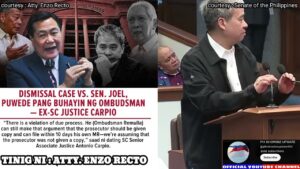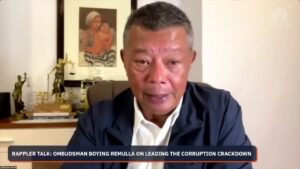The political landscape in the Philippines is once again embroiled in a massive controversy, not simply over corruption but over the very mechanisms of accountability and transparency within the nation’s highest integrity body. At the heart of this storm is the sudden, belated revelation of a 2019 decision by the Office of the Ombudsman that secretly reversed a standing dismissal order against Senator Joel Villanueva—a case stemming from his alleged involvement in the infamous Priority Development Assistance Fund (PDAF) or “pork barrel” scam.
The emerging details point to a profound institutional failure, raising questions about political influence, the integrity of public records, and the equal application of the law.

The Unfolding Scandal: Morales vs. Martires
The core of the controversy involves two powerful figures and their conflicting decisions on the same high-profile case:
1. The 2016 Dismissal (Ombudsman Conchita Carpio Morales)
In 2016, former Ombudsman Conchita Carpio Morales ordered the dismissal of Senator Joel Villanueva from public service, along with his perpetual disqualification from holding any public office. This was based on a finding that he was guilty of Grave Misconduct, Serious Dishonesty, and Conduct Prejudicial to the Best Interest of the Service.
The Allegation: The charge involved the alleged misuse of ₱10 million of his PDAF when he was a Representative of the CIBAC party-list. The funds were purportedly allocated to a dubious non-government organization (NGO), the Aaron Foundation Phils. Inc., for what turned out to be “ghost” agricultural livelihood projects.
The Senate’s Refusal: At the time, the Senate refused to implement the dismissal order, arguing that the Ombudsman lacked disciplinary jurisdiction over members of Congress—a position heavily criticized by Morales and legal experts as a self-serving interpretation of the law.
2. The 2019 ‘Secret’ Reversal (Ombudsman Samuel Martires)
The case, however, took a bizarre turn when the incumbent Ombudsman, Jesus Crispin Remulla, announced that he had discovered a previously unpublished ruling. This ruling, signed by former Ombudsman Samuel Martires in 2019, reversed Morales’ dismissal order.
The Reversal: Martires granted Villanueva’s Motion for Reconsideration, dismissing both the administrative and criminal charges (Malversation of Public Funds and Graft).
The Rationale: Martires asserted there was “no adequate evidence on record” to conclusively prove Villanueva’s actual involvement in the embezzlement, stating that while the public funds were indeed lost, it was due to “unscrupulous persons” and not necessarily a direct conspiracy involving Villanueva. The ruling effectively cleared the Senator.
The Secrecy: The critical issue is that this momentous decision, which fully exonerated a sitting Senator from a major corruption charge, was not publicly announced or published. Only a small circle, potentially including Martires and Villanueva, was aware of the reversal for years.
The Crisis of Transparency and Public Trust
The lack of public disclosure surrounding the 2019 reversal is what has ignited the current firestorm of criticism, led by the incumbent Ombudsman Remulla and former colleagues like Senator Dick Gordon and legal experts like former Solicitor General Florin Hilbay.
🎯 The Questionable Timeline and Procedure
Critics highlight several alarming procedural concerns:
-
The Delay: The Motion for Reconsideration (MR) was filed in 2016, but Martires did not rule on it until 2019—a three-year period that is well beyond the “reasonable time” usually expected for such high-profile cases, prompting former Supreme Court Justice Azcuna to suggest a possible administrative violation.
The Secrecy: Both former Ombudsman Morales and the public were kept in the dark about the decision. As pointed out by Carpio Morales, the original dismissal was a highly public act; the corresponding reversal, which protected a politician’s reputation and career, should have been announced with equal, if not greater, fanfare.
Villanueva’s Silence: Senator Villanueva himself never publicly announced his exoneration. As critics argue, any politician who successfully clears their name in a major corruption scandal would proudly hold a press conference—his silence for three years is viewed as deeply suspicious and indicative of a desire to keep the decision below the radar.
⚖️ The Legal Authority Argument (Florin Hilbay’s Stance)

Former Solicitor General Florin Hilbay provided a compelling legal perspective on the matter, suggesting a path forward for the current Ombudsman. His argument is built on the principle that the original dismissal was a public act, and the reversal, having been conducted in secrecy, may be deemed invalid.
Hilbay’s Thesis: Martires, by acting in secret, deprived the public and interested parties (like the Field Investigation Office) of the ability to question the reversal before the Supreme Court.
The Remedy: Therefore, Ombudsman Remulla could potentially “treat the secret memo as having had no effect” and proceed with the intention to enforce the original 2016 dismissal order by Morales. This action would bypass the controversial 2019 reversal on the grounds of lack of transparency and procedural irregularity that compromises the public interest, which is paramount in cases involving public funds.
🏛️ The Problem of Institutional Capture
The context of Martires’ appointment—being a Duterte appointee—has led many political observers to suggest that the Ombudsman’s office, during that tenure, may have prioritized the protection of politically aligned figures. This sentiment is reinforced by the general perception, noted by former Senator Dick Gordon, that during the previous administration, accountability bodies were often intimidated or circumvented, fostering an environment where public officials felt they could act with impunity. The lack of implementation of the 2016 dismissal by the Senate, and the subsequent quiet reversal, fuel the narrative that there is one set of laws for the powerful and another for everyone else.
Former Ombudsman Morales herself lamented this pervasive problem, stating: “We are the laughing stock of other countries because we don’t know how to enforce our laws. We don’t know how to implement the decisions that come from legal proceedings.”
Conclusion: A Call for Renewed Accountability
The ‘secret’ reversal of Senator Villanueva’s dismissal is more than just a political scuffle; it is a critical test of the current government’s commitment to judicial independence and public transparency. The case exposes the fragility of the checks and balances designed to curb corruption in the Philippines, especially when political influence extends into institutions mandated to ensure accountability.
The current Ombudsman, Jesus Crispin Remulla, now faces the immense pressure of either upholding the controversial, secretly enacted 2019 reversal, or challenging its procedural validity to reinstate the original 2016 findings. The decision will determine not only the fate of a Senator but, more importantly, the public’s faith in the integrity of the Office of the Ombudsman and the principle that public service must be conducted in the full light of day. The people demand a government where justice is not only done but is openly and transparently seen to be done.





